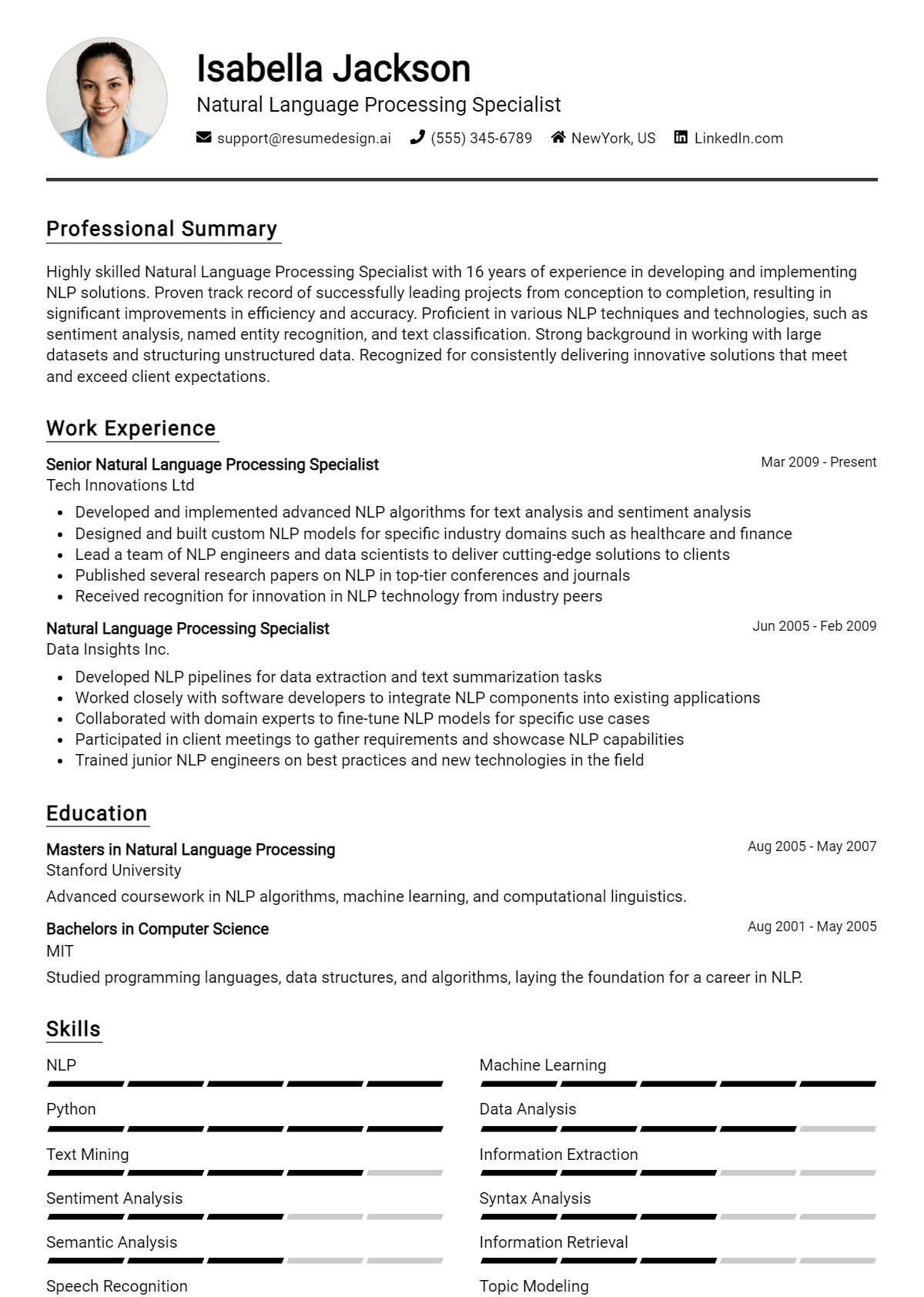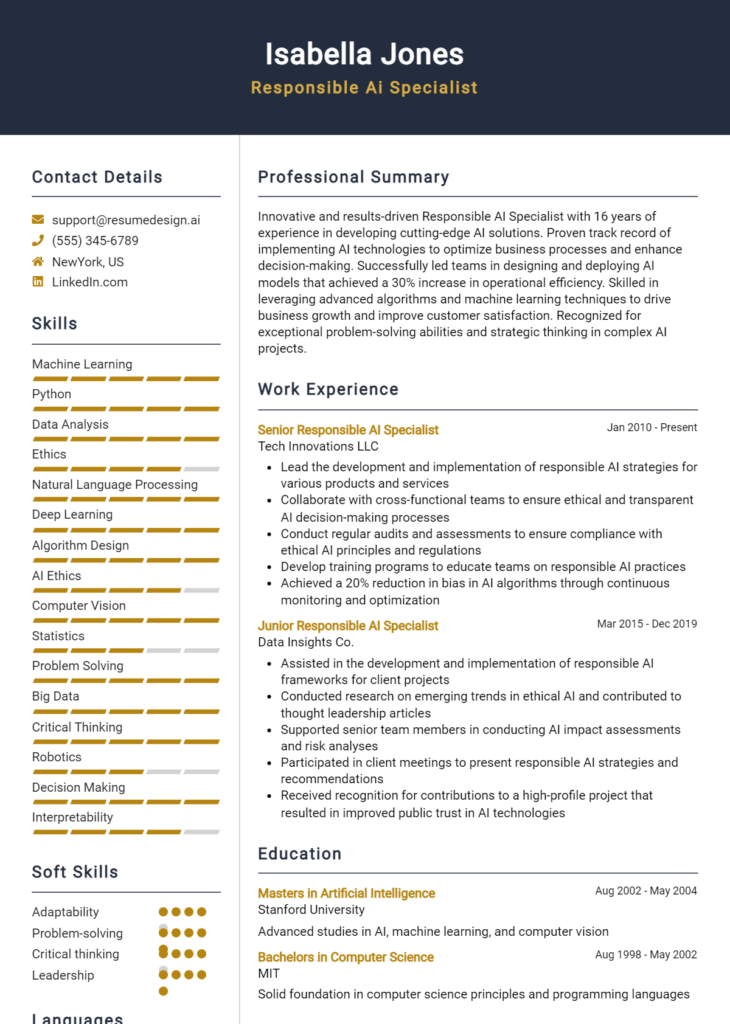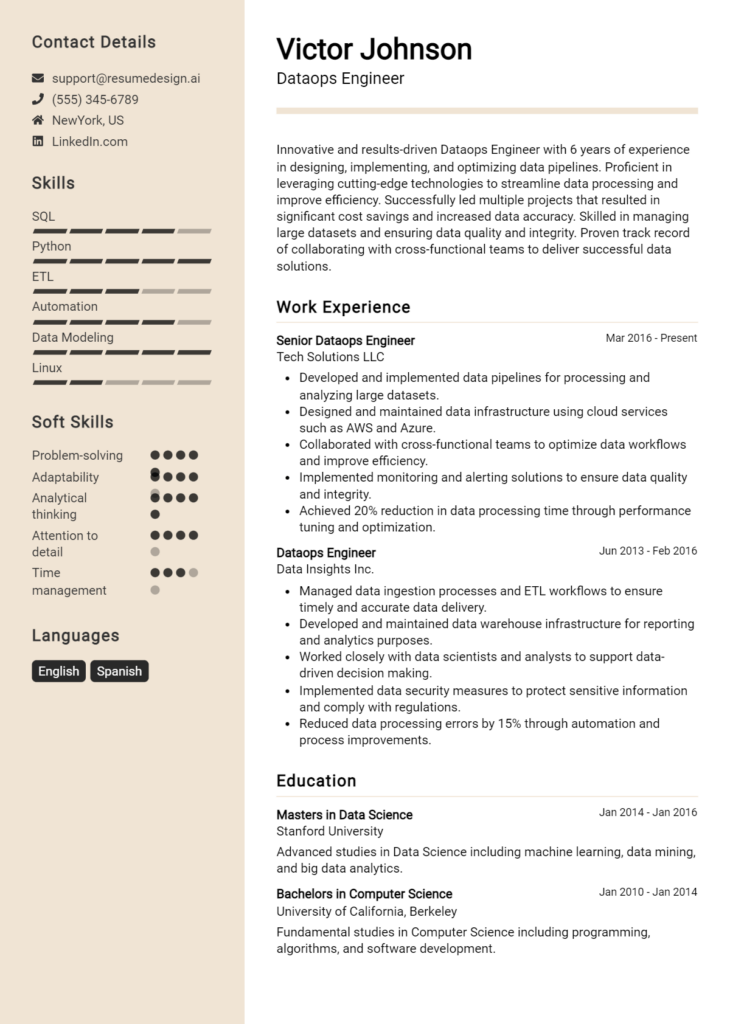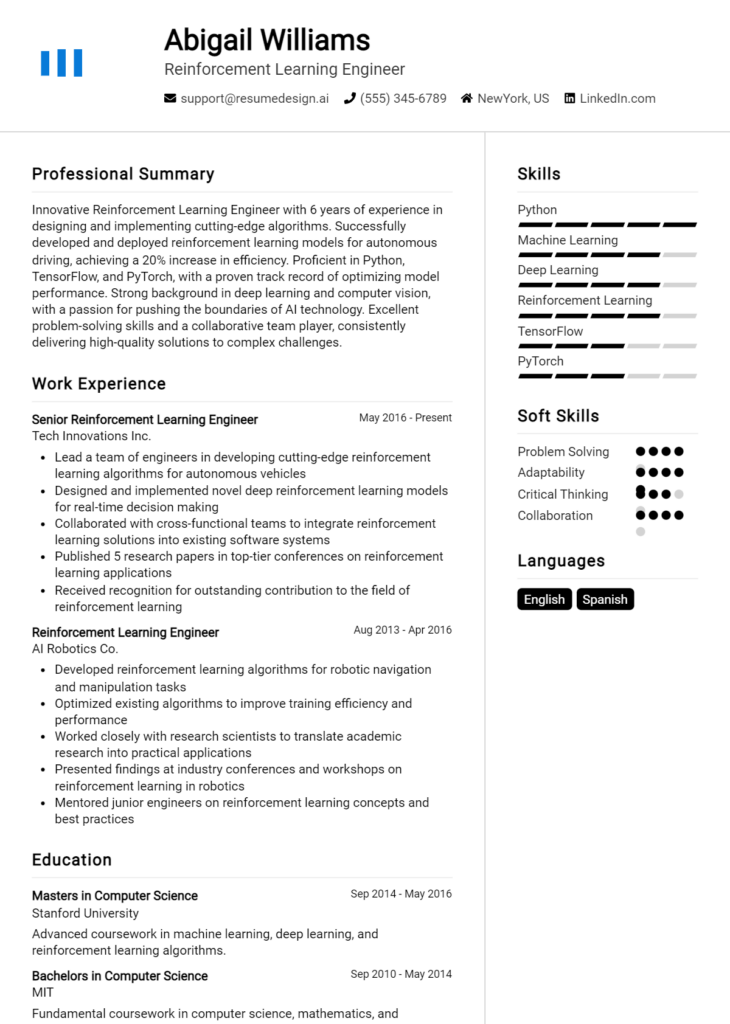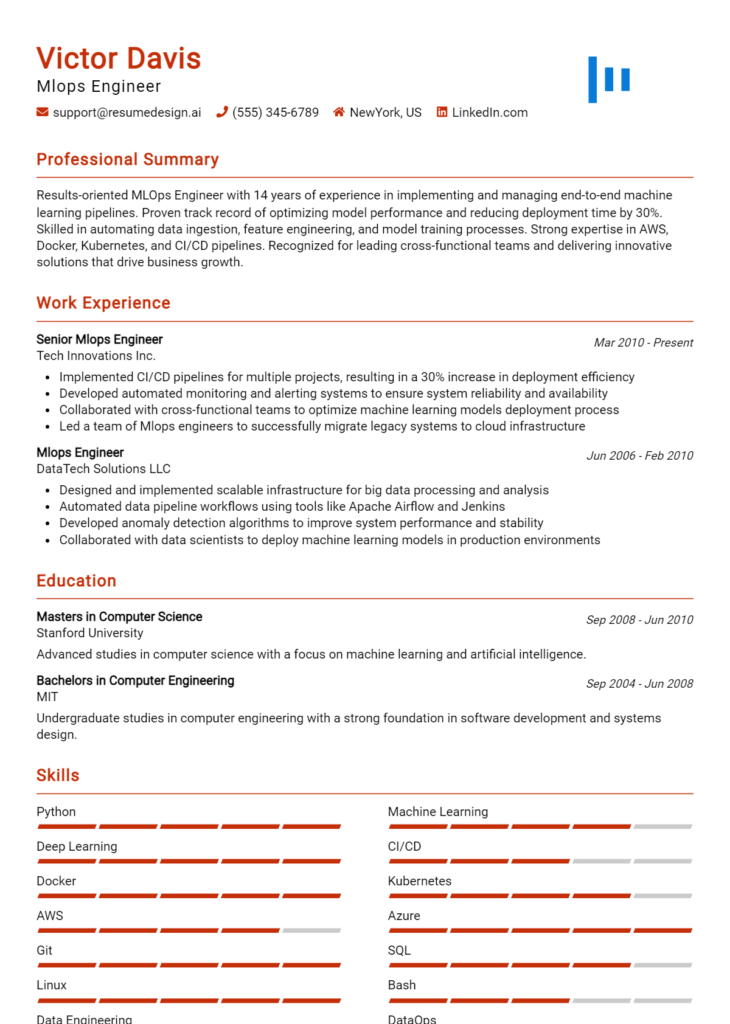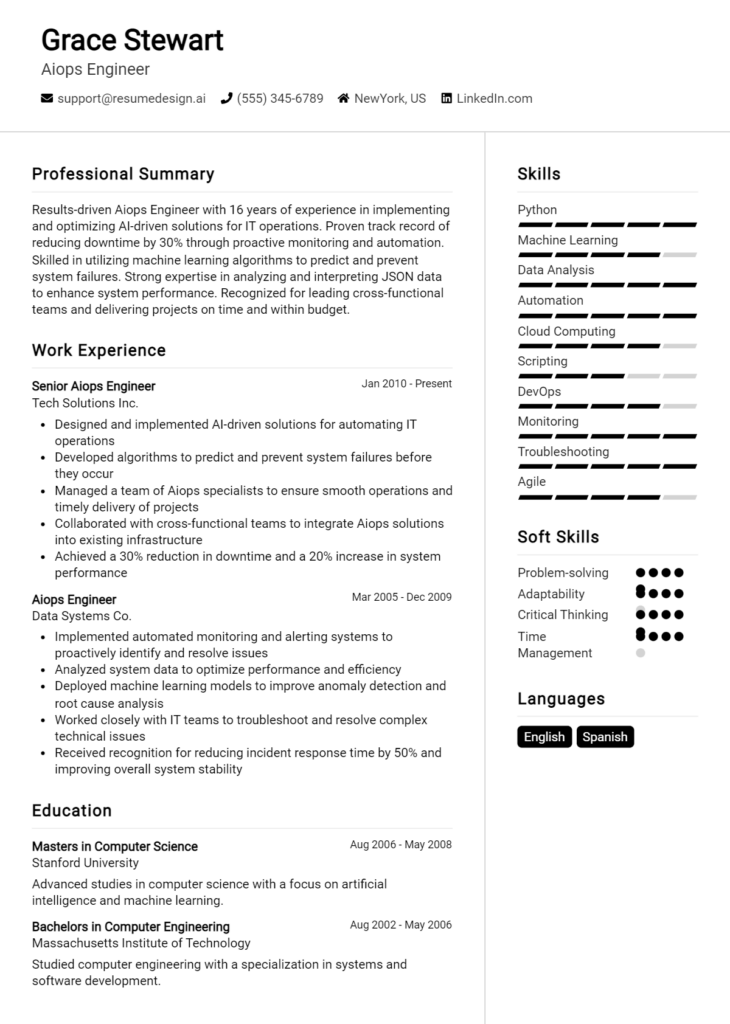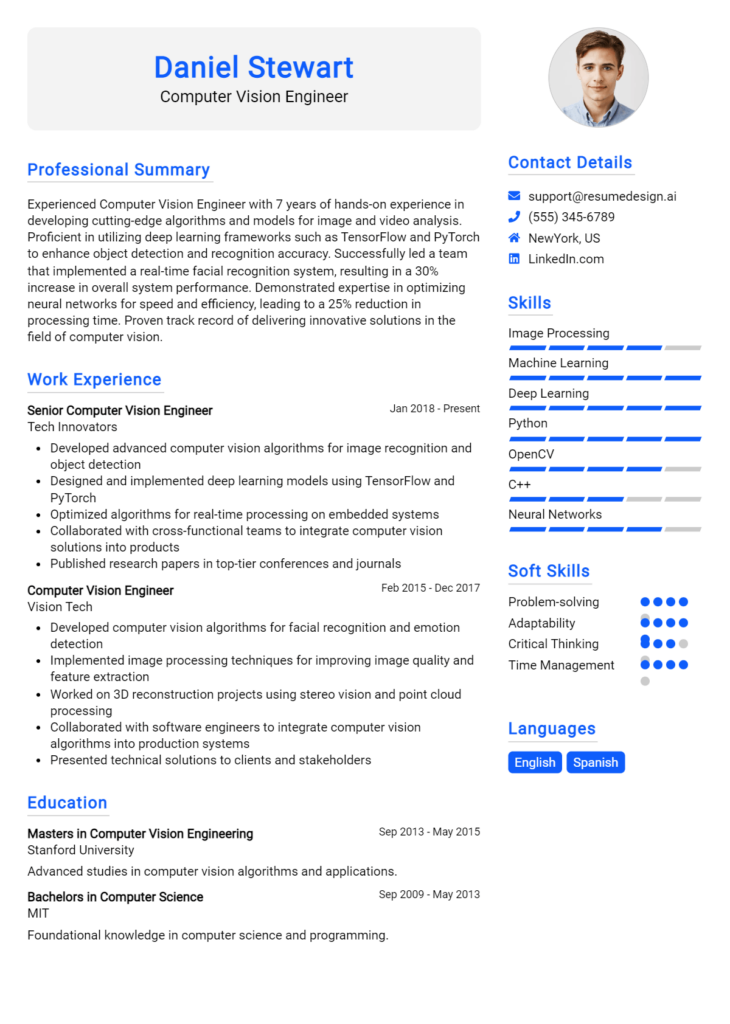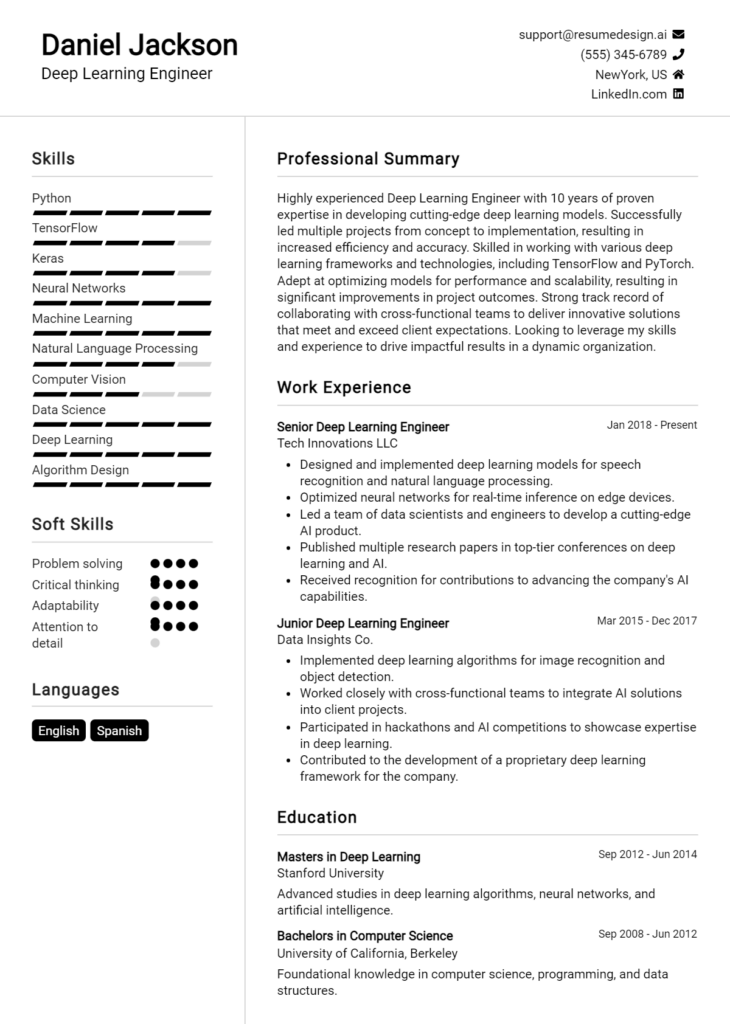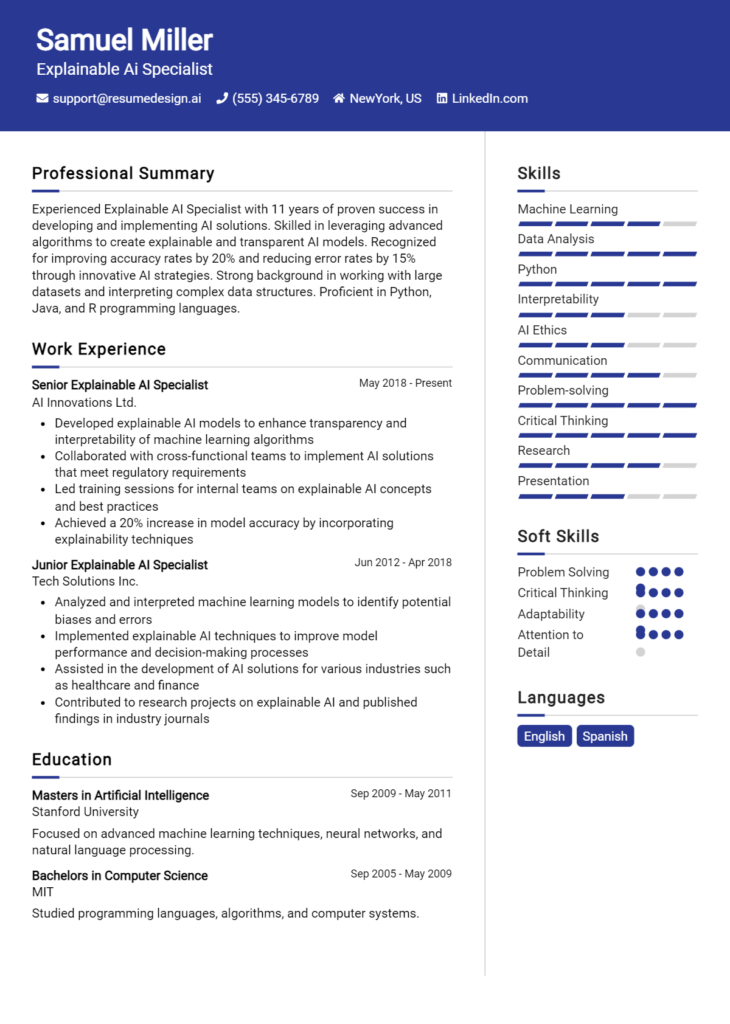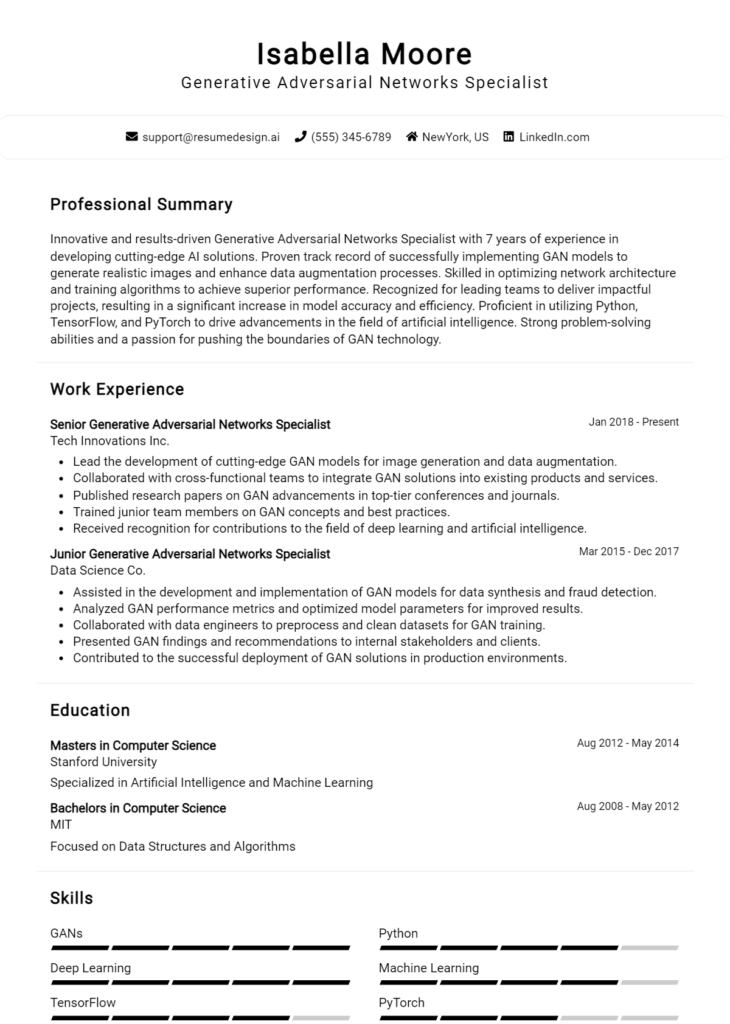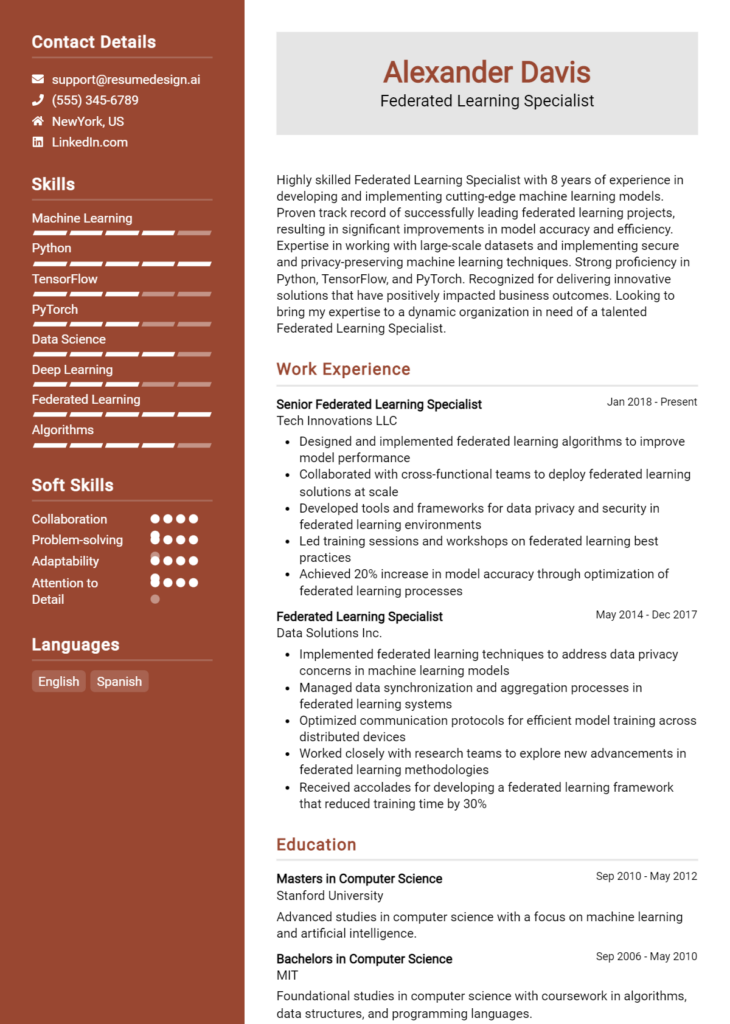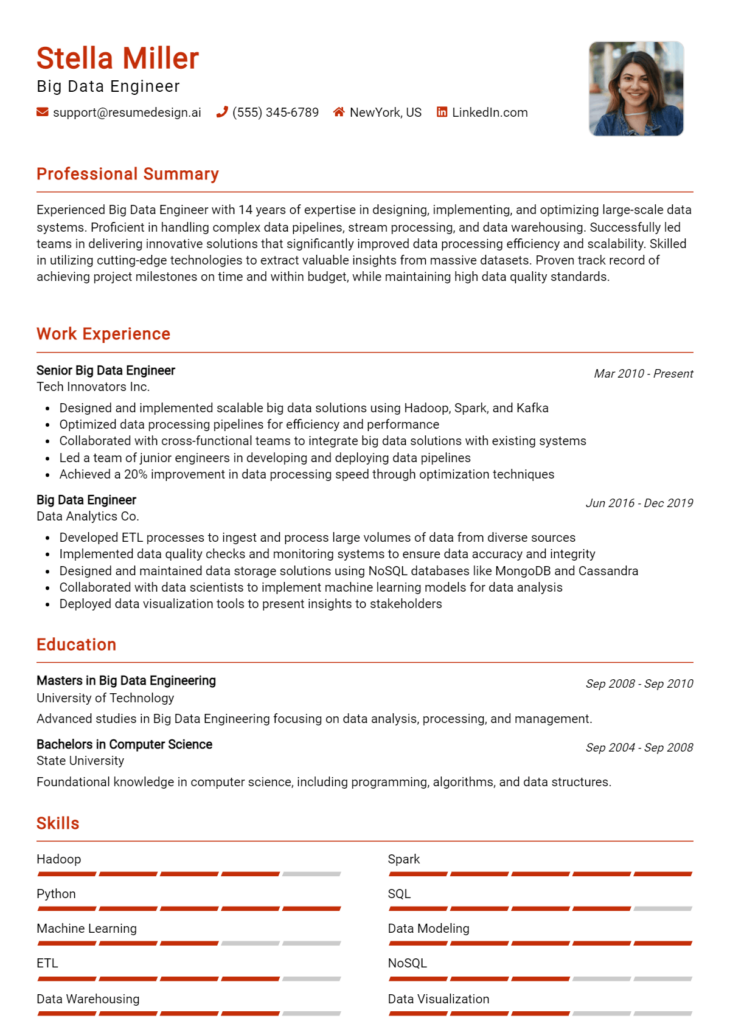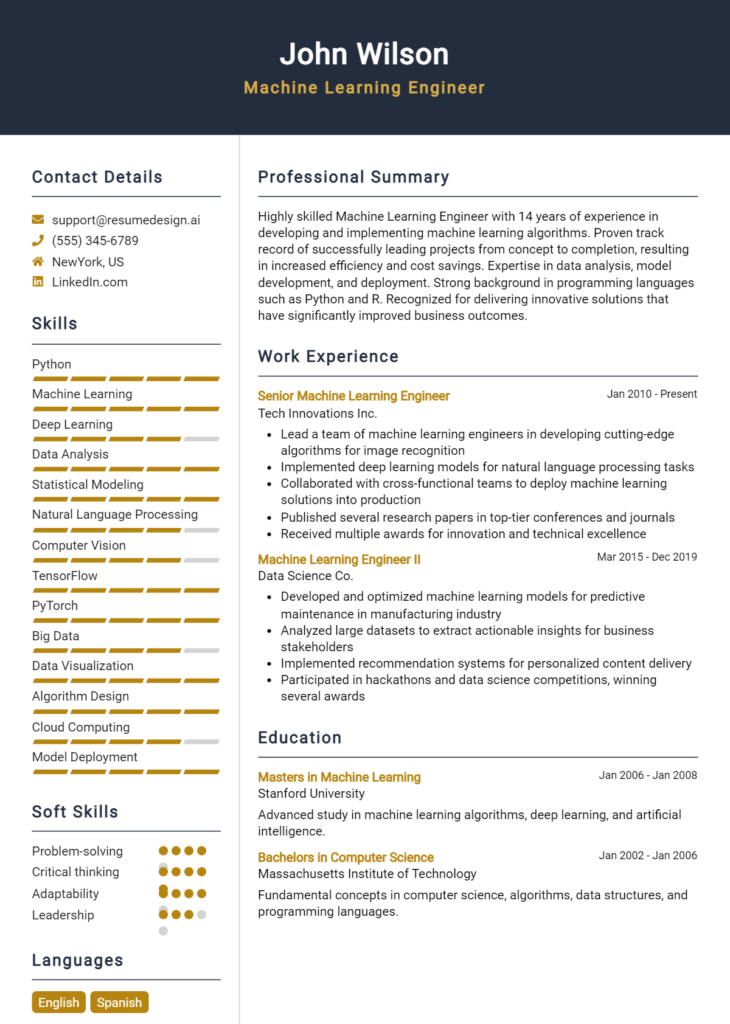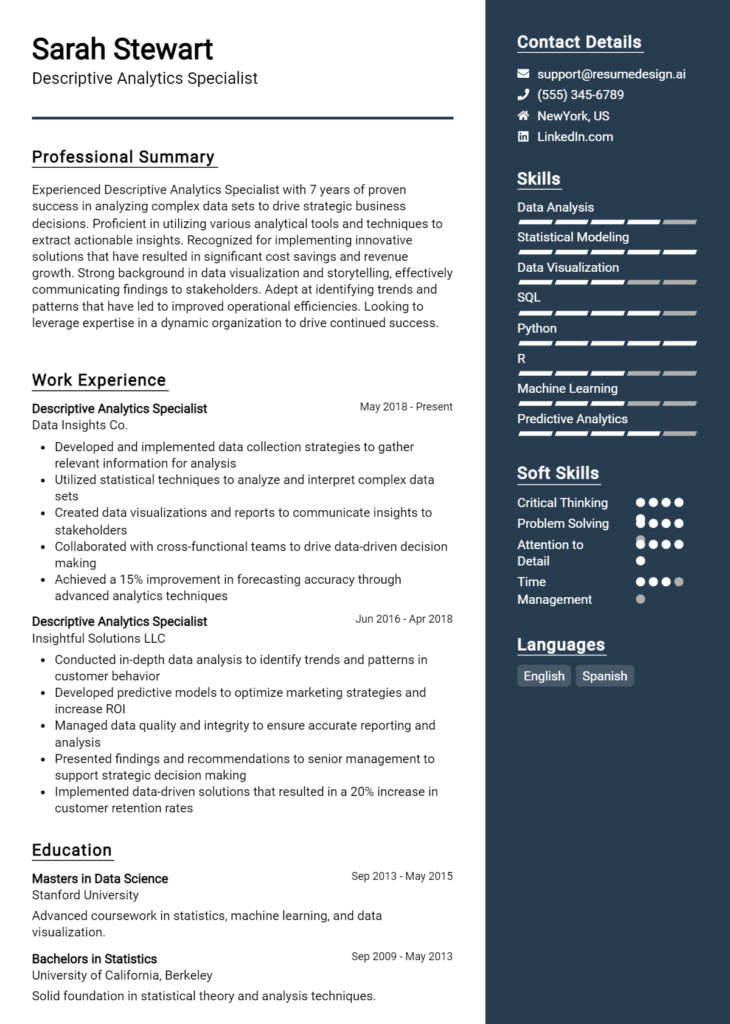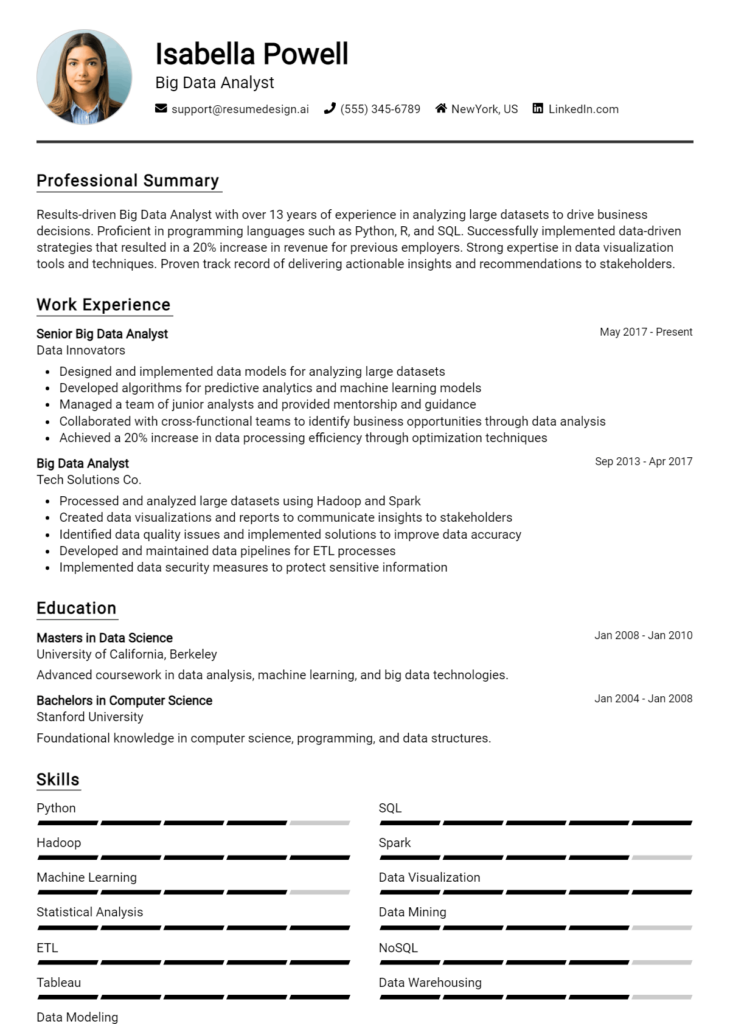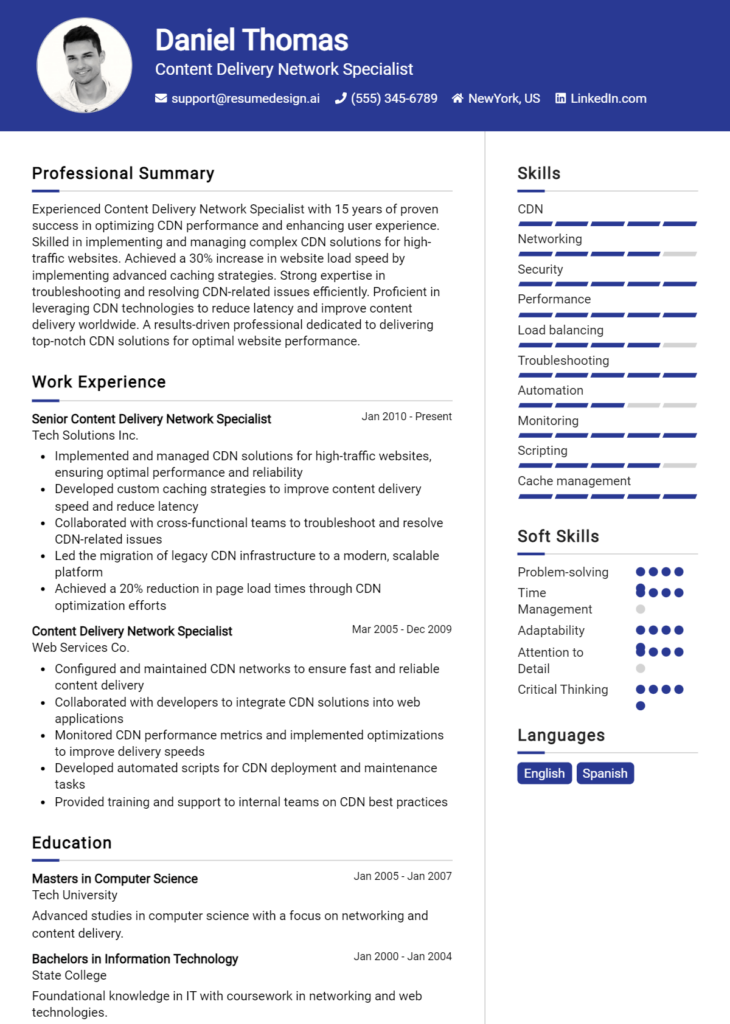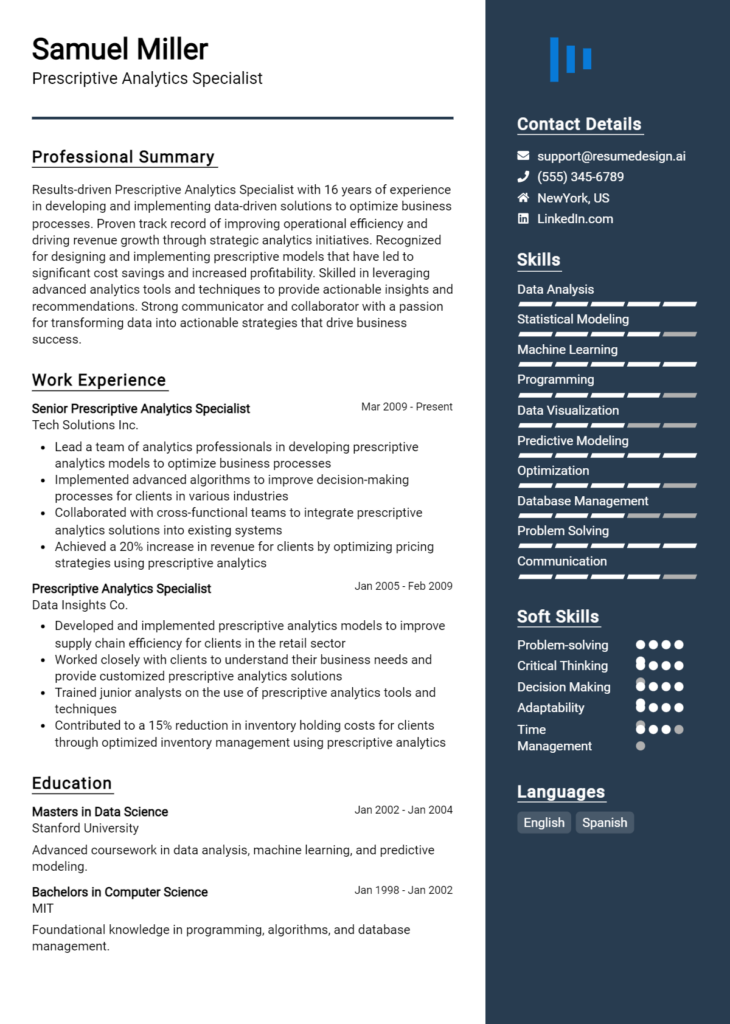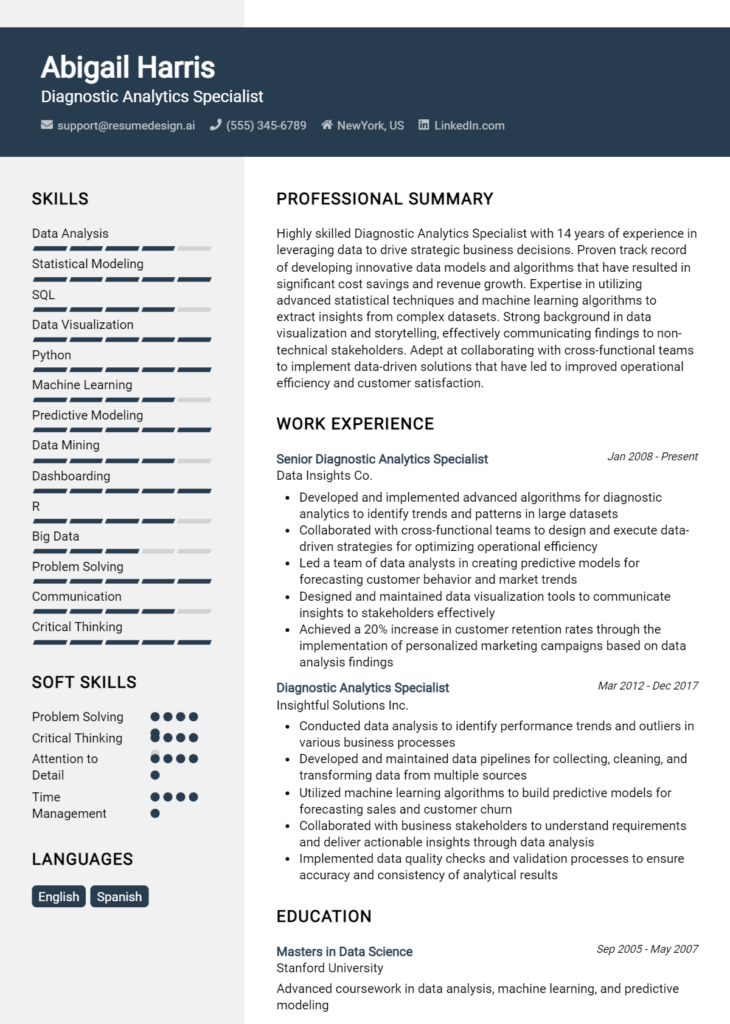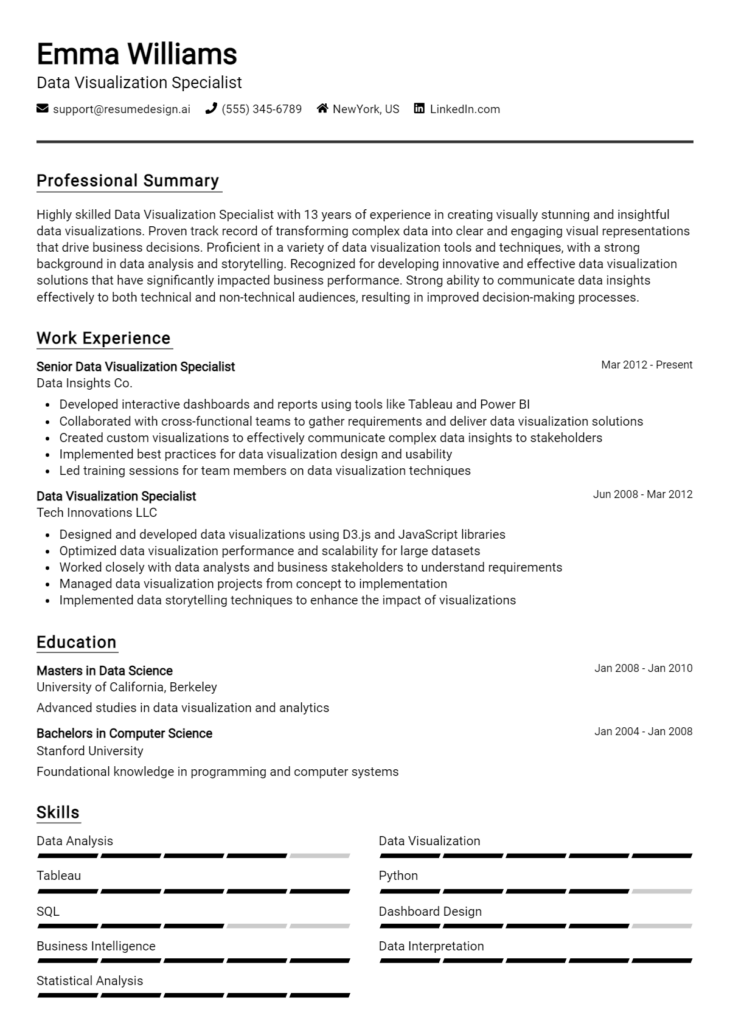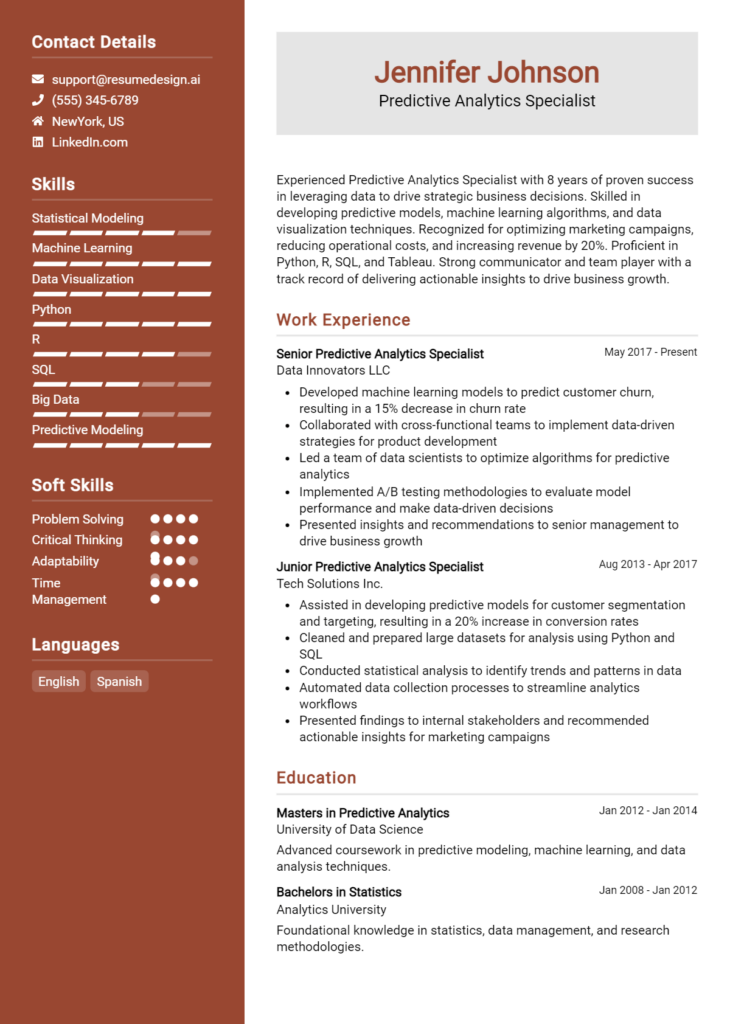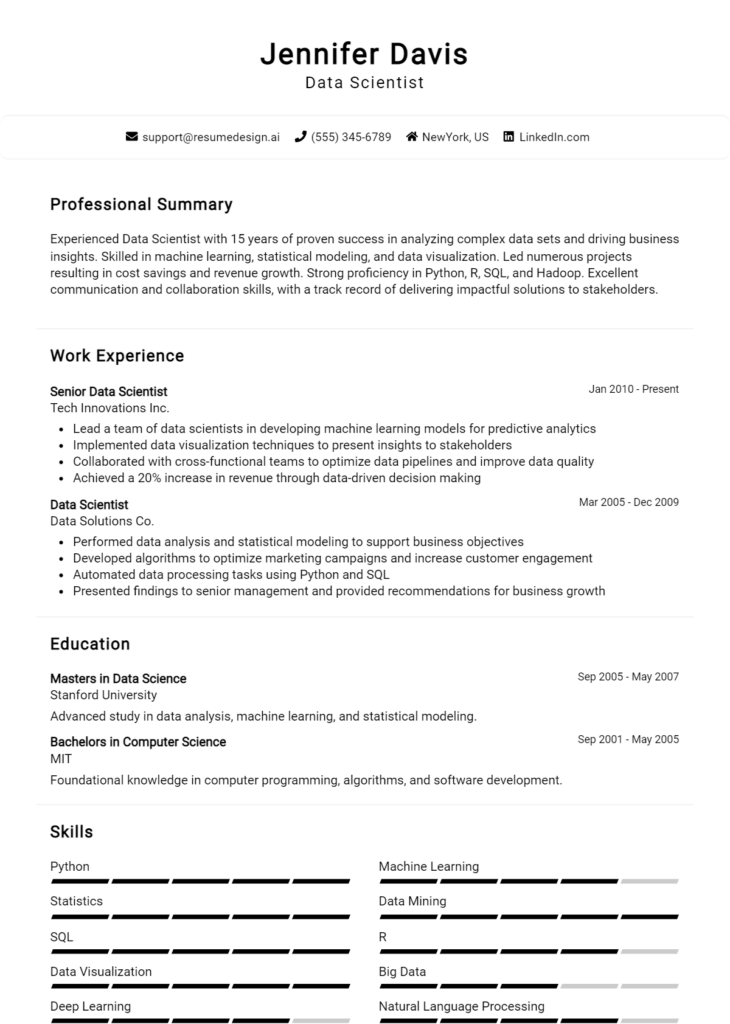Natural Language Processing Specialist Core Responsibilities
A Natural Language Processing (NLP) Specialist plays a crucial role in bridging the gap between technical teams and business units, utilizing advanced algorithms and machine learning techniques to analyze and interpret human language. Key responsibilities include developing NLP models, optimizing data pipelines, and collaborating with data scientists and software engineers. Essential skills include strong programming abilities, operational insight, and effective problem-solving techniques. These competencies not only drive innovation but also align with organizational goals, making a well-structured resume vital to highlight these qualifications.
Common Responsibilities Listed on Natural Language Processing Specialist Resume
- Design and implement NLP algorithms for text analysis.
- Collaborate with cross-functional teams to define project requirements.
- Develop and optimize machine learning models for language processing.
- Conduct data pre-processing and feature extraction.
- Analyze linguistic data to derive insights and improve models.
- Evaluate model performance and implement necessary adjustments.
- Stay updated with the latest NLP research and technologies.
- Document processes and share findings with stakeholders.
- Assist in the deployment of NLP applications in production environments.
- Provide technical support and training for end-users.
- Conduct exploratory data analysis to inform model selection.
- Participate in code reviews and maintain best coding practices.
High-Level Resume Tips for Natural Language Processing Specialist Professionals
In the competitive field of Natural Language Processing (NLP), a well-crafted resume is not just a document; it is your first opportunity to make a lasting impression on potential employers. As an NLP Specialist, showcasing your skills and achievements effectively can set you apart from other candidates vying for the same roles. Your resume should reflect both your technical prowess and your contributions to previous projects, demonstrating your ability to apply NLP techniques to real-world problems. This guide will provide practical and actionable resume tips specifically tailored for Natural Language Processing Specialist professionals, ensuring you present yourself in the best light possible.
Top Resume Tips for Natural Language Processing Specialist Professionals
- Tailor your resume for each job application by carefully reading the job description and aligning your skills and experiences to match.
- Highlight relevant experience in NLP projects, including internships, research, or personal projects that demonstrate your abilities.
- Quantify your achievements where possible; use metrics to illustrate the impact of your work, such as improved accuracy rates or processing speeds.
- Showcase specific industry-related skills, such as proficiency in programming languages (Python, R), NLP libraries (NLTK, SpaCy), and machine learning frameworks (TensorFlow, PyTorch).
- Include a dedicated section for certifications or courses related to NLP, machine learning, or data science to enhance your credibility.
- Use action verbs to describe your responsibilities and achievements, making your contributions clear and compelling.
- Keep your resume concise and focused, ideally one page, to ensure that hiring managers can quickly assess your qualifications.
- Incorporate keywords from the job listing to optimize your resume for applicant tracking systems (ATS) and increase your chances of being noticed.
- Consider adding a summary statement at the top of your resume that encapsulates your experience and what you bring to an employer in the NLP space.
By implementing these tips, you can significantly enhance your resume and improve your chances of landing a job in the Natural Language Processing Specialist field. A well-structured and targeted resume not only showcases your qualifications but also conveys your enthusiasm for the role and the value you can bring to an organization. Make your first impression count!
Why Resume Headlines & Titles are Important for Natural Language Processing Specialist
In the competitive field of natural language processing (NLP), a well-crafted resume headline or title holds significant importance. It serves as the first impression a hiring manager has of a candidate, providing a succinct summary of their key qualifications and expertise in one impactful phrase. A strong headline can immediately grab attention, setting the tone for the rest of the resume. It should be concise, relevant, and tailored to the job being applied for, making it easier for recruiters to quickly assess the applicant's fit for the role. By encapsulating essential skills and experiences, a compelling headline can differentiate a candidate in a crowded job market.
Best Practices for Crafting Resume Headlines for Natural Language Processing Specialist
- Be concise: Limit the headline to one impactful sentence.
- Use specific keywords: Incorporate industry-relevant terms and phrases.
- Highlight key skills: Focus on core competencies that align with the job description.
- Showcase experience: Mention years of relevant experience or notable achievements.
- Tailor for the position: Customize the headline for each job application.
- Avoid jargon: Use clear and straightforward language that is easy to understand.
- Emphasize outcomes: If possible, include quantifiable results from past projects.
- Make it impactful: Use strong action verbs and descriptive language to convey confidence.
Example Resume Headlines for Natural Language Processing Specialist
Strong Resume Headlines
"Data-Driven NLP Specialist with 5+ Years of Experience in Machine Learning and Text Analytics"
“Expert in Natural Language Processing with Proven Track Record in Developing AI-Powered Applications”
“NLP Engineer Specializing in Deep Learning Techniques and Semantic Analysis”
“Results-Oriented Natural Language Processing Specialist with a Focus on Enhancing User Interaction”
Weak Resume Headlines
“NLP Specialist”
“Looking for a Job in NLP”
“Experienced Professional”
The strong headlines are effective because they clearly communicate the candidate's specific expertise, relevant experience, and unique value proposition, making them stand out to hiring managers. In contrast, the weak headlines lack specificity and fail to provide any meaningful information about the candidate's qualifications, which can lead to disinterest and a missed opportunity for consideration. By focusing on clarity and relevance, strong headlines can significantly enhance a candidate’s chances of making a positive impression.
Writing an Exceptional Natural Language Processing Specialist Resume Summary
A well-crafted resume summary is crucial for a Natural Language Processing Specialist, as it serves as the first impression a hiring manager has of the candidate. A strong summary quickly captures attention by highlighting key skills, relevant experience, and notable accomplishments that align with the job requirements. With recruiters often spending mere seconds on each resume, an impactful summary that is concise and tailored to the specific role can significantly enhance a candidate's chances of standing out from the competition.
Best Practices for Writing a Natural Language Processing Specialist Resume Summary
- Quantify achievements: Use numbers to demonstrate the impact of your work, such as improved accuracy rates or reduced processing times.
- Focus on relevant skills: Highlight technical skills such as machine learning, deep learning, and programming languages pertinent to NLP.
- Tailor your summary: Customize the summary for each job application by aligning it with the job description and requirements.
- Use industry-specific terminology: Incorporate relevant jargon and keywords to show familiarity with the field.
- Showcase accomplishments: Mention any awards, certifications, or notable projects that illustrate your expertise.
- Be concise: Keep the summary brief—ideally 2-4 sentences that pack a punch.
- Highlight collaboration: Mention experiences working with cross-functional teams, as communication skills are essential in this field.
- Emphasize problem-solving: Illustrate how you have tackled complex NLP challenges and the solutions you implemented.
Example Natural Language Processing Specialist Resume Summaries
Strong Resume Summaries
Results-driven Natural Language Processing Specialist with over 5 years of experience in developing state-of-the-art machine learning models, achieving a 30% increase in text classification accuracy for a leading e-commerce platform.
Dedicated NLP expert adept at leveraging Python and TensorFlow to create innovative solutions, including a chatbot that reduced customer response times by 50%, enhancing user satisfaction scores by 40%.
Innovative Natural Language Processing Specialist with a track record of implementing deep learning techniques to process and analyze unstructured data, contributing to a 25% improvement in sentiment analysis accuracy for a major financial institution.
Weak Resume Summaries
Experienced in natural language processing and machine learning, looking for a job in a tech company.
Skilled NLP specialist with knowledge of various tools and technologies, seeking to apply skills in a challenging environment.
The examples provided illustrate the key differences between strong and weak resume summaries. The strong summaries effectively quantify achievements and specify relevant skills, making them impactful and tailored to the NLP field. In contrast, the weak summaries are vague, lacking specific outcomes and failing to convey the candidate's value, which ultimately diminishes their effectiveness in capturing a hiring manager's attention.
Work Experience Section for Natural Language Processing Specialist Resume
The work experience section of a Natural Language Processing Specialist resume is crucial as it serves as a detailed showcase of the candidate's technical skills and expertise in the field. This section not only highlights their ability to manage teams effectively but also emphasizes their experience in delivering high-quality products that meet industry standards. By quantifying achievements and aligning previous roles with the expectations of the industry, candidates can demonstrate their impact and readiness for new challenges in the ever-evolving landscape of natural language processing.
Best Practices for Natural Language Processing Specialist Work Experience
- Use specific technical terminology relevant to NLP, such as algorithms, frameworks, and programming languages.
- Quantify achievements with metrics, such as percentage improvements or project timelines, to illustrate the impact of your work.
- Highlight collaboration with cross-functional teams, showcasing your ability to work with data scientists, software engineers, and product managers.
- Include details about the technologies and tools used in projects, such as TensorFlow, NLTK, or spaCy, to demonstrate your technical proficiency.
- Describe your role in leadership or mentoring capacities to illustrate your ability to manage teams and influence project outcomes.
- Align experience with current industry standards and trends, ensuring relevance to potential employers.
- Focus on results-driven narratives, emphasizing how your contributions led to successful project completion and enhanced user experience.
- Customize work experience descriptions for each application by focusing on skills and experiences that match the job description.
Example Work Experiences for Natural Language Processing Specialist
Strong Experiences
- Led a team of 5 data scientists to develop a sentiment analysis tool that increased customer satisfaction scores by 30% within six months of implementation.
- Implemented an NLP-based chatbot solution that reduced customer support response time by 50%, handling over 10,000 inquiries per month.
- Designed and deployed a named entity recognition system that improved data extraction accuracy by 40%, contributing to a significant reduction in manual processing time.
- Collaborated with software engineers and UX designers to integrate NLP features into a mobile application, resulting in a 25% increase in user engagement.
Weak Experiences
- Worked on various NLP projects, contributing to the development of models.
- Helped the team with data processing tasks and other related activities.
- Participated in meetings about project progress and updates.
- Assisted in the implementation of some machine learning algorithms.
The examples listed as strong experiences provide clear, quantifiable outcomes and demonstrate leadership and collaboration within teams, emphasizing the candidate's direct impact on project success. In contrast, the weak experiences lack specific details and measurable results, making them less impressive and failing to convey the candidate's true capabilities or contributions in their roles.
Education and Certifications Section for Natural Language Processing Specialist Resume
The education and certifications section of a Natural Language Processing Specialist resume plays a crucial role in demonstrating the candidate's academic background and commitment to ongoing professional development. This section highlights the candidate's relevant degrees, industry-recognized certifications, and specialized training that align with the demands of the role. By including pertinent coursework and certifications, candidates can greatly enhance their credibility, showcasing their preparedness and dedication to the field of natural language processing (NLP). A well-structured education and certifications section not only reflects the candidate's knowledge base but also signals their initiative in staying current with industry advancements.
Best Practices for Natural Language Processing Specialist Education and Certifications
- Include degrees from accredited institutions relevant to NLP, such as computer science, linguistics, or artificial intelligence.
- List industry-recognized certifications like TensorFlow Developer Certificate or Microsoft Certified: Azure AI Engineer Associate.
- Highlight relevant coursework that directly relates to NLP, such as machine learning, data mining, or computational linguistics.
- Use clear and concise formatting to enhance readability, ensuring details are easy for hiring managers to scan.
- Prioritize recent educational experiences or certifications to demonstrate continuous learning and adaptation to new technologies.
- Emphasize any specialized training programs or workshops that focus on NLP tools and methodologies.
- Consider including online courses from reputable platforms like Coursera or edX to showcase self-directed learning.
- Tailor the education and certifications section to match the specific requirements and keywords mentioned in the job description.
Example Education and Certifications for Natural Language Processing Specialist
Strong Examples
- M.S. in Computer Science with a focus on Natural Language Processing, Stanford University, 2021
- Certified TensorFlow Developer, TensorFlow, 2022
- Relevant Coursework: Advanced Machine Learning, Natural Language Understanding, and Deep Learning for NLP
- Professional Certificate in AI and Machine Learning, MIT, 2023
Weak Examples
- Bachelor's Degree in History, State University, 2015
- Certification in Basic Computer Skills, Online Institute, 2019
- Completed a workshop on Public Speaking, Local Community College, 2020
- High School Diploma, Anytown High School, 2010
The examples are considered strong because they directly relate to the key competencies and knowledge areas required for a Natural Language Processing Specialist role. They showcase relevant degrees and certifications that enhance the candidate's expertise in NLP. In contrast, the weak examples highlight qualifications that lack relevance to the field of natural language processing, such as unrelated degrees or certifications that do not align with the skills needed in the industry, ultimately failing to demonstrate the candidate's suitability for the position.
Top Skills & Keywords for Natural Language Processing Specialist Resume
In the rapidly evolving field of Natural Language Processing (NLP), showcasing the right skills on your resume is crucial for standing out to potential employers. As a Natural Language Processing Specialist, your expertise in both hard and soft skills plays a significant role in your ability to develop and implement models that understand, interpret, and generate human language. Employers are increasingly looking for candidates who not only possess technical knowledge but also demonstrate strong communication, problem-solving, and teamwork abilities. Highlighting these skills effectively can enhance your resume and make you a more attractive candidate in a competitive job market.
Top Hard & Soft Skills for Natural Language Processing Specialist
Soft Skills
- Excellent communication skills
- Strong problem-solving abilities
- Collaborative teamwork
- Critical thinking
- Adaptability and flexibility
- Attention to detail
- Creativity and innovation
- Time management
- Empathy and understanding of user needs
- Continuous learning mindset
Hard Skills
- Proficiency in programming languages (Python, Java, R)
- Familiarity with NLP libraries (NLTK, spaCy, TensorFlow)
- Understanding of machine learning algorithms
- Experience with data preprocessing and analysis
- Knowledge of linguistic concepts and computational linguistics
- Capability in deploying NLP models
- Familiarity with cloud computing platforms (AWS, Google Cloud)
- Experience with version control systems (Git)
- Proficiency in data visualization tools
- Understanding of API integration and development
Developing a well-rounded resume that highlights both skills and work experience will significantly improve your chances of landing an interview and advancing your career in the field of Natural Language Processing.
Stand Out with a Winning Natural Language Processing Specialist Cover Letter
I am excited to apply for the Natural Language Processing Specialist position at [Company Name], as advertised on [Job Source]. With a strong background in computational linguistics and machine learning, I possess the technical acumen and innovative mindset required to contribute effectively to your team. My experience in developing advanced NLP models and applications, combined with a passion for transforming data into actionable insights, makes me a great fit for this role.
In my previous role at [Previous Company Name], I successfully led a project that involved creating a sentiment analysis tool that improved customer engagement by 30%. By leveraging various NLP techniques, such as tokenization, named entity recognition, and deep learning algorithms, I was able to develop a model that accurately interpreted and classified user sentiments from social media data. This project not only enhanced my programming skills in Python and TensorFlow but also deepened my understanding of linguistic nuances, allowing me to fine-tune models for better performance.
Moreover, my academic background in linguistics and data science has equipped me with a unique perspective on how language can be processed and understood by machines. I am adept at using libraries such as NLTK, SpaCy, and Hugging Face Transformers, and I continuously explore emerging NLP trends and technologies to stay ahead in this rapidly evolving field. I am particularly drawn to [Company Name] because of its commitment to innovation and excellence in leveraging AI technologies to enhance user experiences, and I am eager to bring my expertise to your team.
I am looking forward to the opportunity to discuss how my skills and experiences align with the needs of your organization. I am confident that my dedication, combined with my technical abilities, will contribute to the continued success of [Company Name]. Thank you for considering my application. I hope to speak with you soon to explore how I can be an asset to your team.
Common Mistakes to Avoid in a Natural Language Processing Specialist Resume
When crafting a resume for a Natural Language Processing (NLP) Specialist position, it’s crucial to present your skills and experience effectively. Many candidates inadvertently make common mistakes that can undermine their chances of landing an interview. Avoiding these pitfalls can strengthen your application and showcase your qualifications more prominently. Here are some common mistakes to watch out for:
Lack of Relevant Keywords: Failing to include industry-specific keywords can make your resume less visible to applicant tracking systems (ATS) and hiring managers looking for specific skills.
Overly Technical Jargon: While technical expertise is essential, using too much jargon without context can confuse recruiters who may not be familiar with all the terminologies.
Ignoring Soft Skills: NLP roles often require strong communication and teamwork abilities. Neglecting to highlight these soft skills can limit your appeal, especially in collaborative environments.
Inconsistent Formatting: A disorganized or inconsistent format can distract from your qualifications. Ensure your resume has a clean layout with uniform fonts and spacing.
Vague Job Descriptions: Providing generic descriptions of previous roles can make it difficult for employers to gauge your specific contributions. Use quantifiable achievements to demonstrate your impact.
Failure to Tailor the Resume: Submitting a generic resume for each application can reduce your chances of success. Tailor your resume to match the specific job description and company culture.
Not Showcasing Projects or Publications: For an NLP Specialist, showcasing relevant projects, research, or publications can set you apart. Ignoring these elements can underplay your expertise and contributions to the field.
Omitting Continuous Learning: The field of NLP is rapidly evolving. Neglecting to mention relevant courses, certifications, or workshops may suggest a lack of commitment to professional development.
Conclusion
As a Natural Language Processing (NLP) Specialist, you play a crucial role in developing algorithms that enable machines to understand and interpret human language. Throughout this article, we explored the essential skills required for this position, including proficiency in programming languages like Python, knowledge of machine learning techniques, and familiarity with NLP libraries such as NLTK and spaCy. Additionally, we discussed the importance of a solid educational background in linguistics, computer science, or a related field, as well as the value of hands-on experience through projects and internships.
To excel in the competitive field of NLP, having a standout resume is paramount. This document serves as your first impression to potential employers, and it should effectively highlight your skills, experience, and accomplishments. We encourage you to take the time to review and refine your Natural Language Processing Specialist resume to ensure it reflects your expertise and aligns with industry standards.
For added support, consider utilizing resources like resume templates to find a layout that suits your style, or try our resume builder for a guided approach to crafting your resume. You can also explore resume examples for inspiration and see how others have successfully showcased their skills. Don’t forget to complement your resume with a compelling cover letter using our cover letter templates to further enhance your application.
Take action now—review your resume, leverage these tools, and position yourself for success in the world of Natural Language Processing!

